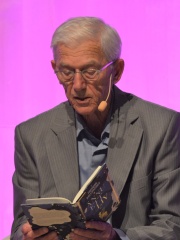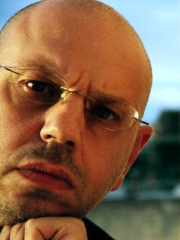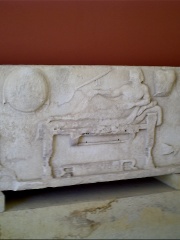


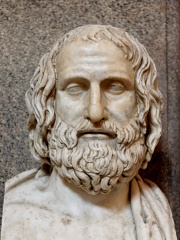

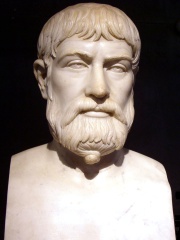
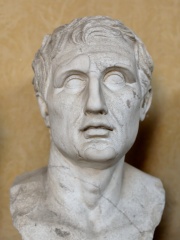
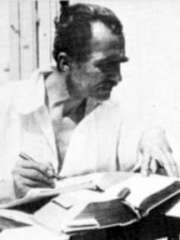
The Most Famous
WRITERS from Greece
Top 10
The following people are considered by Pantheon to be the top 10 most legendary Greek Writers of all time. This list of famous Greek Writers is sorted by HPI (Historical Popularity Index), a metric that aggregates information on a biography's online popularity. Visit the rankings page to view the entire list of Greek Writers.

1. Homer (800 BC - 750 BC)
With an HPI of 95.41, Homer is the most famous Greek Writer. His biography has been translated into 194 different languages on wikipedia.
Homer (; Ancient Greek: Ὅμηρος [hómɛːros], Hómēros; possibly born c. the 8th century BC) was an ancient Greek poet who is widely credited as the author of the Iliad and the Odyssey, two epic poems that are foundational works of ancient Greek literature. Despite uncertainties about his authorship, Homer is considered one of the most influential authors in history. The Iliad centers on a quarrel between King Agamemnon and the warrior Achilles during the last year of the Trojan War. The Odyssey chronicles the ten-year journey of Odysseus, king of Ithaca, back to his home after the fall of Troy. The epics depict man's struggle, the Odyssey especially so, as Odysseus perseveres through the punishment of the gods. The poems are in Homeric Greek, also known as Epic Greek, a literary language that shows a mixture of features of the Ionic and Aeolic dialects from different centuries; the predominant influence is Eastern Ionic. Most researchers believe that the poems were originally transmitted orally. Despite being predominantly known for their tragic and serious themes, the Homeric poems also contain instances of comedy and laughter. The Homeric poems shaped aspects of ancient Greek culture and education, fostering ideals of heroism, glory, and honor. To Plato, Homer was simply the one who "has taught Greece" (τὴν Ἑλλάδα πεπαίδευκεν, tēn Helláda pepaídeuken). In Dante Alighieri's Divine Comedy, Virgil refers to Homer as "Poet sovereign", king of all poets; in the preface to his translation of the Iliad, Alexander Pope acknowledges that Homer has always been considered the "greatest of poets". From antiquity to the present day, Homeric epics have inspired many famous works of literature, music, art, and film. The question of by whom, when, where, and under what circumstances the Iliad and Odyssey were composed continues to be debated. Scholars generally regard the two poems as the works of separate authors. It is thought that the poems were composed at some point around the late eighth or early seventh century BC. Many accounts of Homer's life circulated in classical antiquity, the most widespread that he was a blind bard from Ionia, a region of central coastal Anatolia in present-day Turkey. Modern scholars consider these accounts legendary.

2. Sophocles (497 BC - 406 BC)
With an HPI of 89.32, Sophocles is the 2nd most famous Greek Writer. His biography has been translated into 148 different languages.
Sophocles (; Ancient Greek: Σοφοκλῆς, pronounced [so.pʰo.klɛ̂ːs], Sophoklễs; c. 497/496 – winter 406/405 BC) was an ancient Greek tragedian, one of three from whom at least two plays have survived in full. His first plays were written later than, or contemporary with, those of Aeschylus and earlier than, or contemporary with, those of Euripides. Sophocles wrote more than 120 plays, but only seven have survived in a complete form: Ajax, Antigone, Women of Trachis, Oedipus Rex, Electra, Philoctetes, and Oedipus at Colonus. For almost 50 years, Sophocles was the most celebrated playwright in the dramatic competitions of the city-state of Athens, which took place during the religious festivals of the Lenaea and the Dionysia. He competed in 30 competitions, won 24, and was never judged lower than second place. Aeschylus won 13 competitions and was sometimes beaten by Sophocles; Euripides won four. The most famous tragedies of Sophocles feature Oedipus and Antigone: they are generally known as the Theban plays, though each was part of a different tetralogy (the other members of which are now lost). Sophocles influenced the development of drama, most importantly by adding a third actor (attributed to Sophocles by Aristotle; to Aeschylus by Themistius), thereby reducing the importance of the chorus in the presentation of the plot. He also developed his characters to a greater extent than earlier playwrights.

3. Aristophanes (448 BC - 386 BC)
With an HPI of 84.47, Aristophanes is the 3rd most famous Greek Writer. His biography has been translated into 97 different languages.
Aristophanes (; Ancient Greek: Ἀριστοφάνης [aristopʰánɛːs]; c. 446 – c. 386 BC) was an Ancient Greek comic playwright from Athens. He wrote in total forty plays, of which eleven survive virtually complete today. The majority of his surviving plays belong to the genre of comic drama known as Old Comedy and are considered its most valuable examples. Aristophanes's plays were performed at the religious festivals of Athens, mostly the City Dionysia and the Lenaia, and several of them won the first prize in their respective competitions. Also known as "The Father of Comedy" and "the Prince of Ancient Comedy", Aristophanes wrote plays that often dealt with real-life figures, including Euripides and Alcibiades, and contemporary events, such as the Peloponnesian War. He has been said to recreate the life of ancient Athens more convincingly than any other author. His plays are characterized by preposterous premises, explicit language, wordplays, and political satire. His powers of ridicule were feared and acknowledged by influential contemporaries; Plato singled out Aristophanes's play The Clouds as slander that contributed to the trial and subsequent condemning to death of Socrates, although other satirical playwrights had also caricatured the philosopher. Aristophanes's second play, The Babylonians (now lost), was denounced by Cleon as a slander against the Athenian polis. It is possible that the case was argued in court, but details of the trial are not recorded and Aristophanes caricatured Cleon mercilessly in his subsequent plays, especially The Knights, the first of many plays that he directed himself. "In my opinion," he says through that play's Chorus, "the author-director of comedies has the hardest job of all."

4. Euripides (480 BC - 406 BC)
With an HPI of 84.12, Euripides is the 4th most famous Greek Writer. His biography has been translated into 98 different languages.
Euripides (; Ancient Greek: Eὐριπίδης, romanized: Eurīpídēs, pronounced [eu̯.riː.pí.dɛːs]; c. 480 – c. 406 BC) was a Greek tragedian of classical Athens. Along with Aeschylus and Sophocles, he is one of the three authors of Greek tragedy for whom any plays have survived in full. Some ancient scholars attributed ninety-five plays to him, but the Suda says it was ninety-two at most. Nineteen plays attributed to Euripides have survived more or less complete, although one of these (Rhesus) is often considered not to be genuinely his work. Many fragments (some of them substantial) survive from most of his other plays. More of his plays have survived intact than those of Aeschylus and Sophocles together, partly because his popularity grew as theirs declined: he became, in the Hellenistic Age, a cornerstone of ancient literary education, along with Homer, Demosthenes, and Menander. Euripides is identified with theatrical innovations that have profoundly influenced drama down to modern times, especially in the representation of traditional, mythical heroes as ordinary people in extraordinary circumstances. This new approach led him to pioneer developments that later writers adapted to comedy, some of which are characteristic of romance. He was referred to by Aristotle as "the most tragic of poets", probably in reference to a perceived preference for unhappy endings, but Aristotle's remark is seen by Bernard Knox as having wider relevance, since "in his representation of human suffering Euripides pushes to the limits of what an audience can stand; some of his scenes are almost unbearable." Focusing on the inner lives and motives of his characters in a way previously unknown, Euripides was "the creator of ... that cage which is the theatre of Shakespeare's Othello, Racine's Phèdre, of Ibsen and Strindberg," in which "imprisoned men and women destroy each other by the intensity of their loves and hates". But he was also the literary ancestor of comic dramatists as diverse as Menander and George Bernard Shaw. In the comedies of his contemporary Aristophanes, Euripides is lampooned for his intellectualism. Modern scholars have varied greatly in their views of Euripides, with some regarding him as an iconoclastic intellectual, and others seeing him as a more traditional playwright. Euripides's portrayal of women has attracted particular interest in modern times, on account of the perceptiveness and sympathy with which Euripides depicts women and the difficulties facing them in Greek society, especially in his Medea.

5. Aeschylus (525 BC - 456 BC)
With an HPI of 83.66, Aeschylus is the 5th most famous Greek Writer. His biography has been translated into 102 different languages.
Aeschylus (UK: , US: ; Ancient Greek: Αἰσχύλος Aischýlos; c. 525/524 – c. 456/455 BC) was an ancient Greek tragedian often described as the father of tragedy. Academic knowledge of the genre begins with his work, and understanding of earlier Greek tragedy is largely based on inferences made from reading his surviving plays. According to Aristotle, he expanded the number of characters in the theatre and allowed conflict among them. Formerly, characters interacted only with the chorus. Only seven of Aeschylus's estimated 70 to 90 plays have survived in complete form. There is a long-standing debate regarding the authorship of one of them, Prometheus Bound, with some scholars arguing that it may be the work of his son Euphorion. Fragments from other plays have survived in quotations, and more continue to be discovered on Egyptian papyri. These fragments often give further insights into Aeschylus's work. He was likely the first dramatist to present plays as a trilogy. His Oresteia is the only extant ancient example. At least one of his plays was influenced by the Persians' second invasion of Greece (480–479 BC). This work, The Persians, is one of very few classical Greek tragedies concerned with contemporary events, and the only one extant. The significance of the war with Persia was so great to Aeschylus and the Greeks that his epitaph commemorates his participation in the Greek victory at Marathon while making no mention of his success as a playwright.

6. Sappho (630 BC - 570 BC)
With an HPI of 83.03, Sappho is the 6th most famous Greek Writer. Her biography has been translated into 109 different languages.
Sappho (Ancient Greek: Σαπφώ Sapphṓ [sap.pʰɔ̌ː]; Aeolic Greek Ψάπφω Psápphō; c. 630 – c. 570 BC) was an Ancient Greek poet from Eresos or Mytilene on the island of Lesbos. Sappho is known for her lyric poetry, written to be sung while accompanied by music. In ancient times, Sappho was widely regarded as one of the greatest lyric poets and was given names such as the "Tenth Muse" and "The Poetess". Most of Sappho's poetry is now lost, and what is not has mostly survived in fragmentary form; only the Ode to Aphrodite is certainly complete. As well as lyric poetry, ancient commentators claimed that Sappho wrote elegiac and iambic poetry. Three epigrams formerly attributed to Sappho have survived, but these are actually Hellenistic imitations of Sappho's style. Little is known of Sappho's life. She was from a wealthy family from Lesbos, though her parents' names are uncertain. Ancient sources say that she had three brothers: Charaxos, Larichos and Eurygios. Two of them, Charaxos and Larichos, are mentioned in the Brothers Poem discovered in 2014. She also appears to have had a daughter, traditionally identified with Cleïs, who is mentioned in two of Sappho's fragments, 98 and 132. Sappho was exiled to Sicily around 600 BC, and may have continued to work until around 570 BC. According to legend, she killed herself by leaping from the Leucadian cliffs due to her unrequited love for the ferryman Phaon. Sappho was a prolific poet, probably composing around 10,000 lines. She was best-known in antiquity for her love poetry; other themes in the surviving fragments of her work include family and religion. She probably wrote poetry for both individual and choral performance. Most of her best-known and best-preserved fragments explore personal emotions and were probably composed for solo performance. Her works are known for their clarity of language, vivid images, and immediacy. The context in which she composed her poems has long been the subject of scholarly debate; the most influential suggestions have been that she had some sort of educational or religious role, or wrote for the symposium. Sappho's poetry was well-known and greatly admired through much of antiquity, and she was among the canon of Nine Lyric Poets most highly esteemed by scholars of Hellenistic Alexandria. Sappho's poetry is still considered extraordinary and her works continue to influence other writers. Beyond her poetry, she is well known as a symbol of love and desire between women, with the English words sapphic and lesbian deriving from her name and that of her home island, respectively.

7. Pindar (517 BC - 437 BC)
With an HPI of 79.03, Pindar is the 7th most famous Greek Writer. His biography has been translated into 68 different languages.
Pindar (; Ancient Greek: Πίνδαρος Pindaros [píndaros]; Latin: Pindarus; c. 518 BC – c. 438 BC) was an Ancient Greek lyric poet from Thebes. Of the canonical nine lyric poets of ancient Greece, his work is the best preserved. Quintilian wrote, "Of the nine lyric poets, Pindar is by far the greatest, in virtue of his inspired magnificence, the beauty of his thoughts and figures, the rich exuberance of his language and matter, and his rolling flood of eloquence, characteristics which, as Horace rightly held, make him inimitable." His poems can also, however, seem difficult and even peculiar. The Athenian comic playwright Eupolis once remarked that they "are already reduced to silence by the disinclination of the multitude for elegant learning". Some scholars in the modern age also found his poetry perplexing, at least until the 1896 discovery of some poems by his rival Bacchylides; comparisons of their work showed that many of Pindar's idiosyncrasies are typical of archaic genres rather than of only the poet himself. His poetry, while admired by critics, still challenges the casual reader and his work is largely unread among the general public. Pindar was the first Greek poet to reflect on the nature of poetry and on the poet's role. His poetry illustrates the beliefs and values of Archaic Greece at the dawn of the Classical period. Like other poets of the Archaic Age, he has a profound sense of the vicissitudes of life, but he also articulates a passionate faith in what men can achieve by the grace of the gods, most famously expressed in the conclusion to one of his Victory Odes:

8. Menander (342 BC - 291 BC)
With an HPI of 78.37, Menander is the 8th most famous Greek Writer. His biography has been translated into 69 different languages.
Menander (; Ancient Greek: Μένανδρος, romanized: Ménandros; c. 342/341 – c. 290 BC) was a Greek playwright and the best-known representative of Athenian New Comedy. He wrote 108 comedies and took the prize at the Lenaia festival eight times. His record at the City Dionysia is unknown. He was one of the most popular writers and most highly admired poets in antiquity, but his work was considered lost before the early Middle Ages. It now survives only in Latin-language adaptations by Terence and Plautus and, in the original Greek, in highly fragmentary form, most of which were discovered on papyrus in Egyptian tombs during the early to mid-20th century. In the 1950s, to the great excitement of Classicists, it was announced that a single play by Menander, Dyskolos, had finally been rediscovered in the Bodmer Papyri intact enough to be performed.

9. Nikos Kazantzakis (1883 - 1957)
With an HPI of 76.70, Nikos Kazantzakis is the 9th most famous Greek Writer. His biography has been translated into 59 different languages.
Nikos Kazantzakis (; Greek: Νίκος Καζαντζάκης [ˈnikos kazanˈd͡zakis]; 2 March [OS 18 February] 1883 – 26 October 1957) was a Greek writer, journalist, politician, poet and philosopher. Widely considered a giant of modern Greek literature, he was nominated for the Nobel Prize in Literature in nine different years, and remains the most translated Greek author worldwide. Kazantzakis's novels include Zorba the Greek (published in 1946 as Life and Times of Alexis Zorbas), Christ Recrucified (1948), Captain Michalis (1950, translated as Freedom or Death), and The Last Temptation of Christ (1955). He also wrote plays, travel books, memoirs, and philosophical essays, such as The Saviors of God: Spiritual Exercises. His fame spread in the English-speaking world due to cinematic adaptations of Zorba the Greek (1964) and The Last Temptation of Christ (1988). He also translated a number of notable works into Modern Greek, such as the Divine Comedy, Thus Spoke Zarathustra, On the Origin of Species, and Homer's Iliad and Odyssey.

10. Alcaeus of Mytilene (620 BC - 560 BC)
With an HPI of 76.62, Alcaeus of Mytilene is the 10th most famous Greek Writer. His biography has been translated into 47 different languages.
Alcaeus of Mytilene (; Ancient Greek: Ἀλκαῖος ὁ Μυτιληναῖος, Alkaios ho Mutilēnaios; c. 625/620 – c. 580 BC) was a lyric poet from the Greek island of Lesbos who is credited with inventing the Alcaic stanza. He was included in the canonical list of nine lyric poets by the scholars of Hellenistic Alexandria. He was a contemporary of Sappho, with whom he may have exchanged poems. He was born into the aristocratic governing class of Mytilene, the main city of Lesbos, where he was involved in political disputes and feuds.
People
Pantheon has 94 people classified as Greek writers born between 800 BC and 1966. Of these 94, 2 (2.13%) of them are still alive today. The most famous living Greek writers include Theodor Kallifatides, and Dimitris Lyacos. The most famous deceased Greek writers include Homer, Sophocles, and Aristophanes.
Living Greek Writers
Go to all RankingsDeceased Greek Writers
Go to all RankingsHomer
800 BC - 750 BC
HPI: 95.41
Sophocles
497 BC - 406 BC
HPI: 89.32
Aristophanes
448 BC - 386 BC
HPI: 84.47
Euripides
480 BC - 406 BC
HPI: 84.12
Aeschylus
525 BC - 456 BC
HPI: 83.66
Sappho
630 BC - 570 BC
HPI: 83.03
Pindar
517 BC - 437 BC
HPI: 79.03
Menander
342 BC - 291 BC
HPI: 78.37
Nikos Kazantzakis
1883 - 1957
HPI: 76.70
Alcaeus of Mytilene
620 BC - 560 BC
HPI: 76.62
Arion
700 BC - 660 BC
HPI: 75.03
Archilochus
680 BC - 645 BC
HPI: 75.03
Overlapping Lives
Which Writers were alive at the same time? This visualization shows the lifespans of the 25 most globally memorable Writers since 1700.

